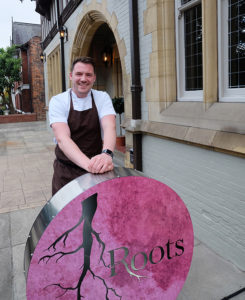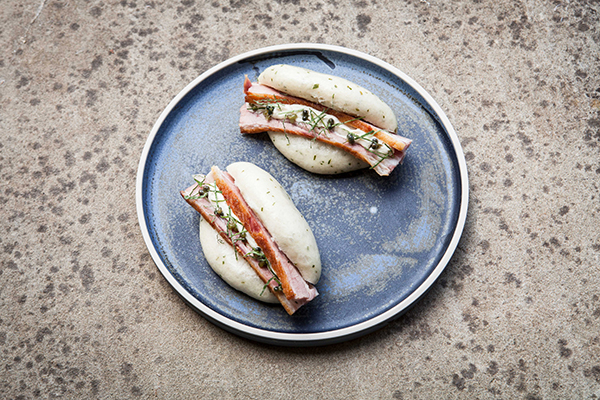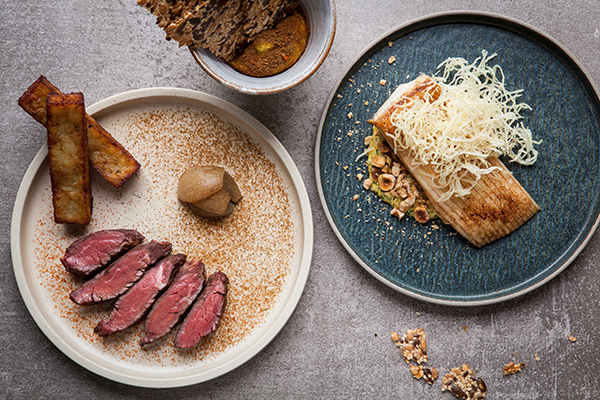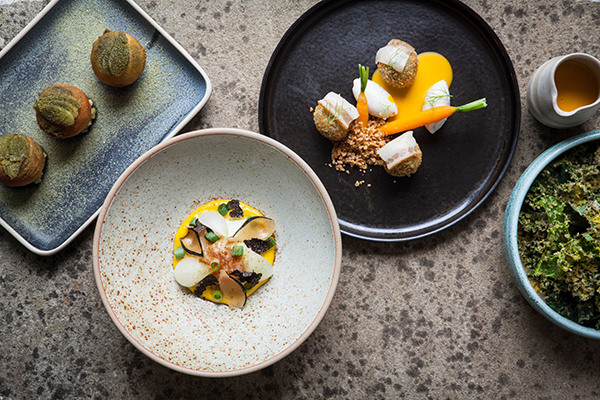The Roots of the matter: Tommy Banks' new restaurant reflects the bounty of the seasons
The bounty of the seasons drives the menu at Roots, the new sharing plate restaurant in York from Michelin-starred chef Tommy Banks. Vincent Wood checks it out
The Guardian's Grace Dent described her visit as a "one of the loveliest lunches of 2018" and awarded it 9/10 across the board. Roots is more accessible - both in terms of its sharing plates concept and its location, five minutes from York train station - than the Black Swan in the village of Oldstead, located in the heart of the North York Moors National Park.
The site is all pale wood and finesse, a mixture of history and personalised touches. Part of that is loyalty to the listed building - Banks stripped out the disco lighting the former tenants had placed behind the Victorian glass ceiling - and other elements have been tailormade, like the bespoke tables with root-like metal legs that twist towards the floor, or the handcrafted plates made by Alison Wren, Surrey Ceramics and York-based potter Jane Schaffer, who also supplies the Black Swan.
While the design of Roots is more casual, the style Banks honed at the Oldstead pub runs throughout the menu, continuing the chef's commitment to quality, to the farm-to-plate concept and to his particular eye for seasonality.
Strictly seasonal
"It's hard work" he says, "but I've got all sorts of amazing roots. I'll have Jerusalem artichokes, they'll work brilliantly. We're drying kilos and kilos of chicory root, which we use in our desserts and in cocktails." His commitment to the seasons involves months of planning and a largescale shifting of staff between the sites. Everyone front of house and roughly half the kitchen staff have spent a few months at the Oldstead farm ahead of the site's launch.
He adds: "The hunger gap doesn't exclusively feature preserved produce. In January I'll speak to my mate down in Pudsey, who supplies Yorkshire rhubarb, so I'll use that in desserts and in savoury dishes. And as you get into February/March time, you can start foraging, so we'll use wild garlic. It isn't exclusively preserved food, but there's very few seasonal gems you can actually use."
But Roots is no quaint nod to the idea of the self-sustained kitchen. "Sometimes you walk past a restaurant and they have a line of Kilner jars of things they've made and that's quite pretty," he says. "But here we're talking about hundreds of kilos of preserved produce. We have a giant shipping container that's full."
The idea of turning his style to a more casual, sharing-based menu came late in the evening after filming Great British Menu. The chef has managed to claim victory twice for his fish dishes on the show and it was eating at a tapas restaurant with other competitors that inspired his new venture. "We'd sit in Ibérica and chat over a beer and a plate of chorizo - and I thought, it's so enjoyable doing that sort of thing. Not that you should really, when you're in the depths of Great British Menu, be thinking about a new restaurant concept."
Faster food
The enjoyment extends to his kitchen. While the Black Swan's star-earning calibre requires absolute precision, the more rustic approach at Roots means service is a much more quick-fire affair. "The first few days we had so much fun. At the Black Swan, you might have to dress a dish with 15 tiny leaves, which takes time and precision. You need one person working on one customer's dish, but here I dress five plates at once. I enjoy it; it's so nice to dip between two totally different styles of food. I think it's really important when you open a second restaurant that it is very different from the first one."
Another change in service is the ticket system - gone is the rail of tickets, replaced by a screen that uses an algorithm to throw up orders in exactly the way Banks wants. "It's 2018, why would I want to write things down on pieces of paper and move them around when I can I have it all on one system?"
However, there is some carryover from the Black Swan. Banks' Crapaudine beetroot, slow-roasted in beef fat and topped with pickled discs of golden and red beetroot, alongside horseradish goats' curd, smoked cods' roe emulsion and linseed crackers, is on the menu of both restaurants.
"That's a big dish for us because we have five acres of beetroot at the farm," he says "My idea is to grow enough beetroot that we could serve that dish to everybody that orders it - because it's our signature, and everyone has it at the Black Swan because of the tasting menu. Enough beetroot for a whole year is quite challenging."
While not a crossover, as it is no longer available at the Black Swan, on the menu is a 2018 version of Banks' Douglas fir parfait with lemon verbena gel. It is not, however, the dish he encourages you to eat.
"I've got this carrot dessert - it's phenomenal, but nobody orders it! People order the Douglas fir because it was on Great British Menu and they order my grandma's apple cake because it's my grandma's apple cake - but there's this carrot dessert that nobody orders, and it's brilliant."
The dish is essentially a tiramisÁ¹, incorporating caramel made from the juice of carrots grown from the farm, combined with rye shortbread and burnt chicory root.
pite around 70% of diners choosing the "feast menu" - a nonspecific tour through the Roots offering - cost and value considerations also come to the fore in a way they do not at the Black Swan. Banks says: "I think from a confidence point of view, I'm very confident with the food at the Black Swan. I know it's good, whereas I think the food tastes really good here, but I'm not as confident in it. I wonder how people will approach it and if they'll think it's good value. It's certainly been a new challenge.
"People are using us as a destination eating establishment and maybe that's what we'll end up being because you're led by your customers. I thought we'd have a lot more people come - especially at lunchtime - sit down, order a couple of plates, be in an hour and leave. They aren't really using us like that, people are booking tables and they're having a really good do. They're having 10 plates between them and lots to drink, and they seem to be loving it."
Roots is certainly more relaxed than the Black Swan - but is it unrealistic to consider a future Michelin nod for the restaurant? Banks says it doesn't really cross his mind.
"I think it's about being busy, cooking the food that we're happy with and hopefully the customers are happy with, and that's it really. If Michelin come, and I think they will, maybe it could be a Bib Gourmand. If they want to give it a star, then fine, but we didn't set it out to be starred. If I was really setting out to try and open a Michelin-starred restaurant, I would have probably done another tasting menu restaurant, or Á la carte, rather than sharing food. Sharing food is… It's not that it can't win a star - but it's more casual, isn't it?"
Banks' work blurs the line between the two - as can be seen by the range of customers who walk through his door, from men in their 20s with their mothers, to people in their 50s talking about the beetroot dish as if they have eaten it five times before and elderly women giving the chef advice on his choice of decor.
"I think that carries on from the Black Swan a bit. We get such a varied demographic of people who come to both restaurants. We get real foodies, then because I'm fairly young we have quite a young crowd as well. I think it's because I've done TV that I've got a very varied crowd, but what I love about both here and the Black Swan is you may get a young couple of lads in T-shirts just having a nice time. Then there will be people dressed up in their absolute Sunday best and neither really stands out. I think it's fine. It's about the food really, more than anything."
About Roots
Roots York, 68 Marygate, York YO30 7BH
www.rootsyork.com
Opened 14 September
Covers 60
Founders Tommy Banks, his parents Anne and Tom Banks, his brother James, and restaurateur Matt Lockwood
Head chef Tommy Banks
Development chef Nick Brown
Restaurant manager Emma Byrne
Tommy Banks's career to date
Tommy Banks began working at the Black Swan at Oldstead, North Yorkshire, after his parents, both farmers, bought the site in 2009.
Starting as a traditional village pub, the Black Swan went on to gain a Michelin star in 2012 under chef Adam Jackson. Banks was catapulted into the spotlight when, having taken over the kitchen at 23 years of age, he retained it to become the UK's youngest chef to hold the accolade at the age of 24.
The Black Swan, which retained the star in the recently published 2019 edition of the guide, relies heavily on produce on its three acres of farmland, which is cultivated by staff from both front and back of house.
The Black Swan, which is still a family affair, was named Tripadvisor's Best Restaurant in the World last year. The chef has also received plaudits outside of the family business - winning BBC TV's Great British Menu twice, in 2016 and 2017.
From the menu
•Roots sour bread and seed crackers, Lincolnshire poacher custard, cultured butter £5
• Kale dressed in sheep's yogurt, pickled walnuts and cured egg yolk £5
• Sour pea falafel, pork fat and carrots £8.50
• Cured trout and Oldstead piccalilli £8.50
• Crapaudine beetroot cooked slowly in beef fat £10
• Oldstead onions, duck egg and truffle £14.50
• Thornback ray wing, 'tartar' sauce and hazelnuts £16.50
• Ox cheek, cauliflower and kale £17.50
• Skirt steak 'sour garni' £17.50
• Cod, broccoli, smoked mussel sauce £20
• Courtyard Dairy cheese £14
• Mary Banks' apple cake, Oldstead honey and crème fraÁ®che £8.50
• White chocolate, Douglas fir and lemon verbena '2018' £8.50
• Carrot and chicory root tiramisÁ¹ £8.50
• 'Fruit and Kernel', damsons with woodruff toast £8.50
Or a selection of sharing plates - the 'Roots Feast' - priced at £50 per person
Continue reading
You need to be a premium member to view this. Subscribe from just 99p per week.
Already subscribed? Log In














